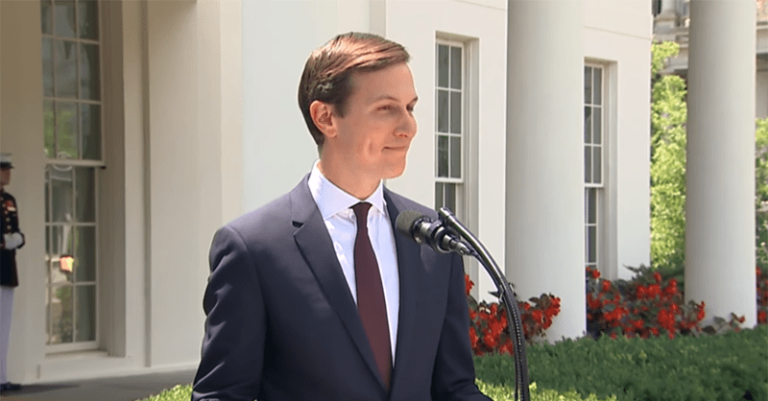
President Donald Trump’s son-in-law and senior advisor, Jared Kushner, gave an interview to the Palestinian Al Quds newspaper on June 24 (original Arabic, English translation), in an effort to address the Palestinian public directly and circumvent the Palestinian leadership in the runup for the yet-to-be-revealed American peace plan.
ACW fellows and academic board members analyze the implications of Kushner’s statements and the anticipated “deal.”
Kushner’s Tone-Deafness
Khalil E. Jahshan
In his interview, Jared Kushner claims that he has done “a lot of listening,” having spent his precious time “focusing on the people and trying to determine what they actually want.” Apparently, Kushner does not know many Palestinians, or he failed to take good notes.
Most Palestinians I know are very determined, industrious, and hard-working. They would welcome “the new opportunities and better paying jobs” that Kushner is dangling before their eyes. However, Palestinians are well-educated and politically savvy enough to know that their problem is not purely economic—that first and foremost, it is political in nature. Of course, they want normalcy in their daily life and a thriving economy, but they realize, clearly better than Jared Kushner and Trump’s advisor, Jason Greenblatt, that meaningful change only comes with action on fundamental concerns: ending the Israeli military occupation of Palestine and attaining national self-determination, with the realization of the Palestinians’ inalienable and universally recognized political rights, including the right of return to millions of Palestinian refugees.
Kushner accuses Palestinian President Mahmoud Abbas of having harbored the same talking points for the past 25 years. In fact, Trump’s envoy must acknowledge these long-held aspirations of the Palestinian people if Washington is truly interested in listening to them, or in moving forward on peace. Go back to the drawing board Mr. Kushner; your biased ideas are neither an “ultimate” nor a coherent “plan”!
Here We Go Again—Economic Development as the Key to Solving the Palestine Conflict
Michael C. Hudson
In the early 1950s, President Dwight Eisenhower appointed Eric Johnston as his special representative for the Middle East. Johnston came up with the Jordan Valley Unified Water Plan in the hope that economic development would ease Arab-Israeli tensions. It didn’t work. Later, Shimon Peres envisioned a “new Middle East” in which regional growth would trump political conflict. It didn’t work either. Today, Jared Kushner argues that the Palestinian people would trade their political goals for the benefits of economic development, from being next to “the Silicon Valley of the Middle East—Israel” and with funding, presumably, by the Gulf Arab states. This also won’t work, especially since Trump and his son-in-law have so brazenly thrown American support for Netanyahu’s right-wing agenda, cleverly exploiting Mahmoud Abbas’s incompetence and unpopularity.
Fundamental Misreading of Palestinian Politics
Yousef Munayyer
It is not uncommon for officials to try to reach out directly to the people in an attempt to circumvent what they see as an intransigent leadership. President Barack Obama did the same in recent years when he spoke to Israeli youth to make the case that a two-state solution was in the long-term interest of Israel, even if their government, led by Prime Minister Benjamin Netanyahu, was making that outcome impossible. What Kushner misunderstood, however, when he granted the interview to Al Quds is that Abbas has been far more pliable than Netanyahu or the Palestinian public. Kushner is attempting to go around Abbas to convince Palestinians that the Washington-led negotiations they want Abbas to avoid are worth restarting with the United States. His attempt reflects the ongoing failure in US policy to address the legitimacy and sustainability problem facing the Palestinian Authority. If Kushner’s effort was meant sincerely, it was, at best, borne out of a fundamental misreading of the Palestinian public and Palestinian politics.
Kushner Reveals the Flawed Premises of Trump’s Peace Deal
Tamara Kharroub
Kushner’s statements signal the extent to which the Trump Administration is out of touch with reality as well as the flawed premises on which it has based its new peace plan. What is remarkable is how Kushner’s deeply uninformed statements are unapologetically condescending toward the Palestinians. “Don’t allow your grandfathers’ conflict to determine your children’s future,” Kushner appealed to the Palestinian public, without any regard for or understanding of the daily struggles of Palestinians who continue to live under repressive Israeli military occupation. He flippantly dismissed Palestinian rights and international law as Abbas’s “talking points which have not changed in the last 25 years.” Additionally, Kushner’s only concrete reference to the “deal” is an economic development plan for Gaza, to be underwritten financially by Arab Gulf states (this is while the United States cuts funds to UNRWA and the Palestinian Authority). Reducing the conflict to a mere economic issue and placing sole responsibility for its non-resolution on President Abbas and not Israel, is a clear echo of Israeli right-wing falsehoods and an attempt to preemptively blame the Palestinian leadership for the eventual failure of the deal. Although the Palestinians are the weakest players in this game, no deal can be achieved without their unequivocal participation. A lasting peace cannot be imposed by the Trump Administration or Arab states without justice as its primary premise.
No Regional Enthusiasm for Kushner Plan
Joe Macaron
It has become clear that Jared Kushner is betting on the Arab states to persuade President Mahmoud Abbas to come to the negotiating table. While these traditional Arab allies of the United States do not seem enthusiastic about the US peace plan, they are hoping to avoid two scenarios: 1) publicly rejecting the plan and risking a potential confrontation with President Trump, or 2) embracing the plan and potentially facing public protests at home. Moreover, Jordan’s foreign policy is increasingly vulnerable given the country’s dire economic situation. Both Riyadh and Doha have not yet committed to providing the $1 billion of aid for the Gaza Strip, and until the Gulf Cooperation Council crisis is resolved, there might be challenges in implementing this initiative. Saudi Arabia is focused on deterring Iran and Egypt is not willing to tackle the sensitive Palestinian issue, which might have repercussions on its regional alliances. The traditional Arab allies of Washington tacitly favor maintaining the status quo and letting things play out on their own. Indeed, scapegoating Abbas might serve as the ideal course of action to relieve them from having to engage with the improbable Kushner plan.





